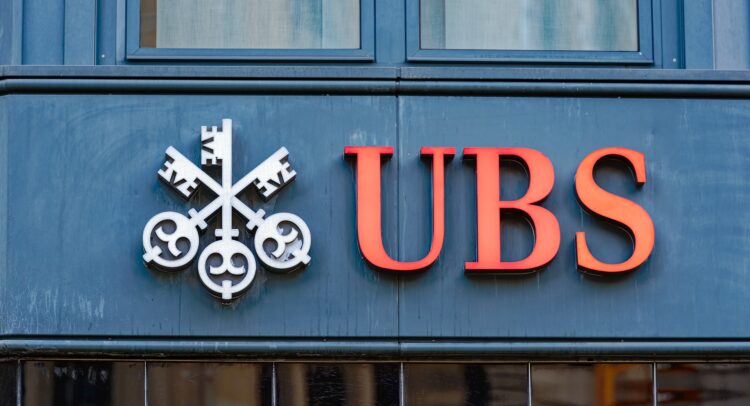Today’s hidden gem is an international bank stock that you might never have owned before. It’s UBS Group (UBS) stock, which could be the secret Financial sector weapon in your portfolio. I am bullish on UBS stock because the company is successfully and profitably navigating its integration of another important bank, and I hope that more U.S.-based stock traders discover UBS’s growth opportunities.
Claim 50% Off TipRanks Premium
- Unlock hedge fund-level data and powerful investing tools for smarter, sharper decisions
- Stay ahead of the market with the latest news and analysis and maximize your portfolio's potential
UBS Group is based in Switzerland and is a gigantic financial institution. In March of 2023, UBS agree to buy out another Swiss bank, Credit Suisse, which was in major trouble at the time.
UBS Group plans to sell Credit Suisse’s U.S. mortgage servicing business, but this doesn’t mean UBS is in financial trouble or plans to divest Credit Suisse entirely. By all indications – and according to the data – UBS is faring well even during this period of change and uncertainty.
UBS’s “Significant Progress”
UBS Group completed its merger with Credit Suisse on May 31, 2024. Surely, this hasn’t been an easy process for UBS, but CEO Sergio Ermotti observed the “significant progress we have made since the closing of the acquisition.”
The data from 2024’s second quarter supports Ermotti’s observation. For example, UBS’s revenue grew 15% year-over-year to $6.053 billion, “largely driven by the consolidation of Credit Suisse revenues for the full quarter.”
Granted, it’s a costly process to integrate one big Swiss bank into another. Thus, in Q2 of 2024, UBS’s operating expenses increased 27% year-over-year to $5.183 billion, “largely due to the consolidation of Credit Suisse expenses for the full quarter and an increase in financial advisor compensation reflecting higher compensable revenues.”
Still, it looks like the Credit Suisse buyout is a net win for UBS now. Notably, the consolidation of Credit Suisse’s revenues in Q2 2024 was largely responsible for UBS’s 32% increase in Asset Management revenue and 27% growth in Personal & Corporate Banking revenue.
Furthermore, UBS still intends to realize significant cost savings, even during the Credit Suisse integration. Indeed, UBS is targeting approximately $13 billion in cost savings by the end of 2026, and the company currently expects to achieve $7 billion in gross cost savings this year versus its previous current-year savings target of $6.5 billion. UBS’s planned divestment of Credit Suisse’s U.S. mortgage servicing business may be related to these savings objectives, though I couldn’t confirm this.
UBS Profits Despite a “Volatile” Market Environment
Ermotti didn’t mince words when he told analysts, “The market environment is quite volatile, and there are elements of fragility that we see.” That’s a reasonable observation, as only a “fragile” market environment would have caused Credit Suisse to falter in the first place.
Yet, UBS Group appears to be holding up well under pressure. The evidence, once again, can be discovered in the data from 2024’s second quarter.
For one thing, UBS’s net profit of $1.1 billion easily surpassed the consensus estimate of $530 million. Moreover, UBS reported adjusted earnings of $0.34 per share, beating Wall Street’s consensus forecast of $0.29 per share. Plus, this represents UBS’s second consecutive quarter of profitable EPS estimate beats.
That’s not the only positive news. Reportedly, UBS intends to repurchase around $1 billion worth of its own shares this year. Corporate share buybacks tend to be a sign that the company is confident in itself. In addition, these repurchases can also reduce the supply of circulating shares, which may have a positive effect on the share price.
All in all, the market seems quite pleased with UBS’s results. UBS stock is 5% higher today, but it’s still roughly break-even on a year-to-date basis. Could a long-overdue breakout be in the cards before the year is over?
Anything is possible, especially in light of UBS’s generally favorable second-quarter data. While you’re waiting for the potential share-price breakout, you can take advantage of UBS’s 2.3% forward annual dividend yield, which is higher than the Financial Sector average dividend yield of 2.114%.
Is UBS Stock a Buy, According to Analysts?
On TipRanks, UBS comes in as a Moderate Buy based on seven Buys, seven Holds, and one Sell rating assigned by analysts in the past three months. The average UBS Group stock price target is $31.76, implying 3.35% upside potential.

If you’re wondering which analyst you should follow if you want to buy and sell UBS stock, the most accurate analyst covering the stock (on a one-year timeframe) is Kian Abouhossein of JPMorgan (JPM), with an average return of 24.28% per rating and an 80% success rate. Click on the image below to learn more.

Conclusion: Should You Consider UBS Stock?
Not long ago, investors may have questioned the wisdom of UBS Group acquiring Credit Suisse, a bank that was in serious trouble at the time. Today, however, it appears that UBS is managing its Credit Suisse integration successfully and beating Wall Street’s EPS forecasts.
Some U.S.-based investors won’t know about these developments, but that’s fine since you can secretly buy shares of UBS and collect some nice dividends. So, I’m strongly bullish on UBS stock right now, and I would consider adding some shares to my portfolio.
















